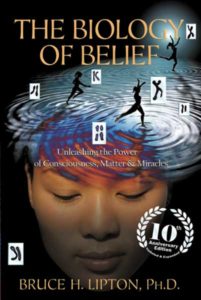At the beginning of 2018, I read a modern translation of As a Man Thinketh by James Allen. It’s a short read, but it’s very powerful and easy applied to one’s thinking around life.
Author Sam Torode did the translation of the Allen’s work. At the end of the book he offers application ideas along with a couple of book recommendations. One of the books he recommends is The Biology of Belief by Bruce Lipton. His intro to it reads:
For a scientific perspective on how our thoughts affect our lives – even at the cellular level – read these fascinating books.
That was all I needed to read to know I had to add the book to my reading list.
To truly understand The Biology of Belief, one must first know that Bruce Lipton started his career as a cell biologist. He received his doctorate at the University of Virginia, spent time in the Department of Anatomy at the University of Wisconsin’s School of Medicine, and performed research at Stanford University’s School of Medicine. Needless to say, when it comes to cells, Dr. Lipton know his stuff.
In the first third of the book, Lipton explains cell biology in layman’s terms, or at least terms that I was able to understand. Through the discussion, he reveals the power of the cell membrane and how it interacts with the environment to control the behavior and physiology of the cell. The punchline – our genes aren’t in control of our cells. The cell membrane is in control of our genes, turning them on and off in response to signals from the environment. As if that’s not enough, Lipton shows how the principles of quantum physics influence the cell membrane to effect cell behaviors.
Mind. Blown.
Yes. The principles within in the book are very ‘new age.’ Fundamental scientists would surely disagree with Lipton, but his research is sound . It’s been validated and proven through experiments, trials, and real world experiences. New areas of scientific research such as epigenetics are based off of his findings. (In basic terms, epigenetics is the study of how one’s behaviors and the environment affect how our genes work rather than the other way around.)
The big idea from Lipton’s work is that we are not victims of our genetic code. We have the ability to influence and enhance our genetic code through our behaviors, our thoughts, and the energy we impart to our cells.
As if my mind wasn’t already blown, Lipton takes it one step further when he discusses self and identity. He talks about how quantum energy in the universe interacts with our cells to affect our identity, and how through our thoughts and actions we put quantum energy back into the universe. As wacky as this may sound, it brings new meaning to the concept of karma. Lipton then connects all the dots by showing how the workings of our cells point to the existence of a power greater than ourselves. In his view, it proves that there is a supreme force, greater than ourselves, at work in the universe, with which I would wholeheartedly agree.
The Biology of Belief is quite a contrast to another book I read recently, The Magic of Reality. In Dawkins work, he uses scientific theory to disprove the existence of a supreme being while Lipton does the exact opposite. Lipton uses scientific research to reinforce why faith, belief, and spirituality are important aspects of one’s life. Most interesting for me is that both books served to reinforce my faith and belief in God. The more I learn about how the human body works, the more it amazes me. The sheer fact that we are composed of millions of cells that must not only work together but also perform specialized functions is unbelievable, not to mention that nearly all of our cellular activity occurs without us having to consciously think about it. When considered in that light, it only makes sense that there must be a greater force at work in the universe.
Overall, I found the Biology of Belief to be an enlightening and mind-blowing read. It’s certainly new age, but very eye-opening when you look at how practices such as meditation, affirmations, positive thinking, and maintaining an optimistic attitude affect our health. I highly recommend the books. It’s a must read.


Since you liked those books, you might also like my new book – Darwin misunderstood what “life” is – where I as a retired geneticist and molecular biologist deliver a thorough criticism of scientific fundamentalism, and where instead of pitching the arts against each other I combine biological science with quantum physics, psychology, philosophy, and spirituality to derive a deeper understanding of our existence and place in creation. That turns the concept of “the fittest” completely upside down and gives evolution a much more appropriate role than to serve in a selfish struggle for survival.
I can provide you with the Epub by mail.